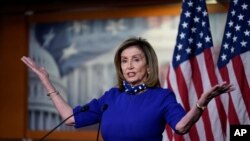The White House and congressional Democrats made no progress Thursday on a coronavirus financial relief package that has been stalled for weeks, as benefits ran out for millions of unemployed Americans.
House Speaker Nancy Pelosi said a Thursday afternoon call with White House Chief of Staff Mark Meadows “made clear that the White House continues to disregard the needs of the American people as the coronavirus crisis devastates lives and livelihoods.”
Pelosi and Senate Democratic leader Chuck Schumer last met with Treasury Secretary Steven Mnuchin and Meadows at the end of July, just as $600 a week in supplemental federal unemployment benefits expired for millions of Americans put out of work because of the coronavirus pandemic.
Commenting Tuesday on Pelosi’s negotiating position to Politico, Meadows said, “I think privately she says she wants a deal, and publicly she says she wants a deal, but when it comes to dealing with Republicans and the administration, we haven't seen a lot of action."
In a statement Thursday, Pelosi said negotiations would resume “once Republicans start to take this process seriously.”
Pelosi and other Democrats have proposed an extension of those benefits, while Republicans have countered with a measure that would set aid at 70% of what a worker was paid before being laid off.
U.S. lawmakers are running out of days in the session to negotiate an agreement. The congressional schedule includes more district work periods, allowing members to campaign for approaching elections in their home districts.
Agreeing on an overall price tag for a second massive relief package will also be difficult in an election year. Democrats are calling for $3 trillion in new spending, while Republicans have proposed $1 trillion.
The Republican-majority Senate is working on a smaller, so-called “skinny relief” bill that would provide some temporary aid and that could be tied to the upcoming September 30 government funding deadline. But Pelosi and other Democrats have rejected a “piecemeal” approach to more coronavirus relief aid.
Earlier this year, Congress quickly passed a $2.2 trillion measure, one of the largest relief packages in U.S. history, to address the economic and health crises caused by the pandemic.





